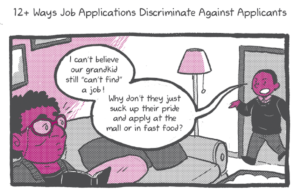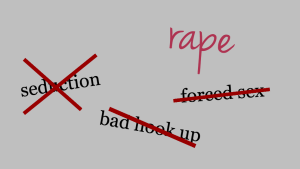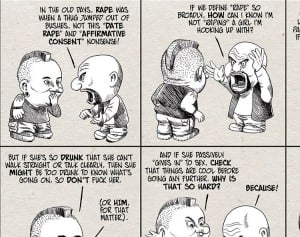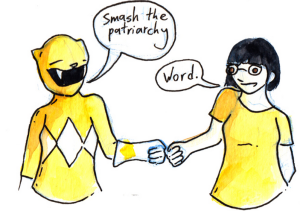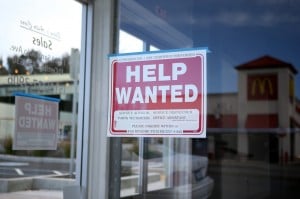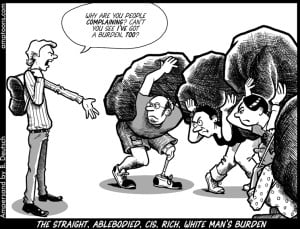(Content Note: descriptions of disordered eating)

Two people of size in athletic attire, walking briskly through Central Park, NY.
I’m standing in front of a vending machine in the seventh grade cafeteria of my middle school, and I’m torn between a Snickers Ice Cream Bar and some vegetable-flavored potato chips. I know the former has more calories in it, but it also contains peanuts. “Peanuts are filled with protein,” I think to myself. “And protein is good.” The latter will inevitably taste like sand paper.
I begin to mentally tally what I’ve eaten in the day up until that point: some Eggo waffles and sausage links in the morning, a banana on the bus, and a Special K granola bar in between second and third periods. I don’t think I’ve consumed “too many” calories yet, but I can’t be certain.
No amount of rationalizing helps me feel less guilty about my desire for the Snickers’ caramel-y goodness as I stare down at my protruding belly, though. I can’t see the entirety of my feet if I look straight down, and a women’s magazine at the doctor’s office had recently told me that this was a sign my body was “unacceptably fat.”
The article the advice was in was something about “reasons why your husband might be leaving you.” I didn’t have a husband. But I had a belly. What if it got so big that my future mate couldn’t help but leave me?
“I’ll be good,” I tell myself. “I probably shouldn’t have eaten the Eggos this morning, but I can make up for it now.”
Almost as though on autopilot, my coins slide into the machine’s slot, and I watch some poorly processed carrots and broccoli make their way towards me. I rip the package open, and place the first chip into my mouth. Sand paper would probably taste better than this, but at least I can feel positive about myself.
I’ve made the right decision. I’ve done a great thing. I deserve to feel like a good person.
For the rest of the day, my thirteen-year-old self indeed feels like she’s achieved something comparable to curing cancer: There was no way this was going to be a weight-gain day. Hell, she might even lose a pound if she skipped on the carbs come dinnertime. If that were to happen, she’d be an even better person come the morning.
Although my teen years were filled with a lot of calorie-counting, Special K meal plans, and tears shed over dress sizes, this memory remains particularly vivid because of the extent of worth I so clearly placed on two snack foods.
Sure, one was probably healthier by the standards of most medical experts. But neither should have arguably had the power of making me feel like a good person versus a shitty one. Neither should have been able to make me feel like I was a winner or a failure. They should’ve been allowed to exist as the inanimate, morally neutral sources of energy that they were.
And yet, my consumption or avoidance of them could totally derail or uplift my mood. For quite some time, the calories I put into my body determined how successful, moral, and good a human being I thought myself to be.
Eventually, I knew I’d be on such a low-cal diet that my body wouldn’t be able to reject weight loss. The pounds would just slide off, and I’d finally be thin, pretty, and good.
As an adult, I’ve come to realize that there are plenty of morally neutral aspects of life that we assign deeper value to unnecessarily. For some, it might be money. For others, it might be the amount of booze they can handle without puking it all up on a night out. For many, it can be things that seem to exist in direct correlation to our body image.
Whether we’ve been told by outside forces (be it television, glossy publications, presidential candidates, or intrusive relatives) that these things should influence the way we feel about ourselves or we’ve come to the conclusion of our own volition, I’d argue that it’s time to reconsider as many of them as possible.
At the end of the day, these things are just that: things.
Self-worth and self-love are not often easy to cultivate in this world. So we simply don’t need to add to the struggle by seeking meaning where there might not be any.
1. Food
I don’t believe there’s anything inherently wrong with feeling positive after doing something that feels healthy to you – be it consuming a meal that fills you with energy, munching on some dark chocolate to uplift your mood, or taking a stroll through the forest.
What I believe is problematic is assigning moral value to the foods we eat, and in doing so, allowing ourselves to feel like garbage humans depending on our caloric intake.
Food can be a seriously joyous part of life when we allow it to be.
It can serve as the catalyst that brings families and friends together for an evening of connection. It can be something to bond over and share on a first date. It can be a pick-me-up after a bad one, or a source of enjoyment after a long afternoon at the office. Food can be delicious, inspiring, and creative: Every bite and every taste a reminder that you are alive, and that your body is allowing you to experience a practically orgasmic tiramisu or açai bowl or whatever else strikes your palate’s fancy.
I personally feel great about my body when I take just a second to think about all the seriously incredible banana and chocolate chip pancakes it’s allowed me to ingest in my 25 years.
But to fear food, and in turn to use it as a marker of your successes and failures, is not only to do a disservice to the food itself – something that undoubtedly exists to nourish, replenish, and excite you – but to do a disservice to yourself.
There is so much more that goes into being a person than the things we eat. In fact, I’d wager that our personalities and moral compasses have very little, if anything at all, to do with food. And if this is true, then there’s no reason for calories or nutritional charts to factor into our body image, either.
2. Dress Size
As a kid, I used to watch my mother and her sister get ready for nights out. I so appreciated the intricacy with which they applied their lip liner and the skills it must have taken to perfectly shape those brows. They each seemed to own an arsenal of sparkly dresses (many of them remnants of the ‘80s) more impressive than any wardrobe I’d come across in fiction. I was awestruck.
But whenever they’d come across an old piece of clothing that no longer fit, something seemed to change.
The powerful women with tangible joie de vivre in front of me would start falling apart. They would lament their youth, chastise themselves for being so allegedly undisciplined, and for “letting themselves go.” And eventually, they’d either decide to skip the evening out altogether or hide their figures beneath the baggiest skirt or co-ord set they could find.
Most of us have experienced similar moments, or witnessed people we adore crumble in front of old mirrors while grasping at too-small threads. It’s never ceased to blow my mind: the way a dress size can so quickly and painfully destroy someone’s body image for the day, or throughout their lives.
Whenever I get together with Mallorie Dunn, the owner and designer of size-inclusive brand Smart Glamour, she reminds me of a fact that should, in theory, be quite simple to grasp: Dress size is just an accumulation of threads.
Some bodies require more threads than others. Some require more fabric and more time spent sewing everything together. And all this means is that our bodies – like the people we are internally – are each unique.
Some of us have love handles, and some of us don’t. Some of us have booties that curve outwards, and some of us have ones that lie flat. None of these characteristics – let alone the dress sizes needed to accommodate them – should reveal anything about our worth as human beings.
Your dress size (or any clothes size, for that matter!) is just a tag inside the clothing: clothing that ultimately serves to decorate an already incredible person (and a pretty rad body).
3. Weight
Funny how numbers keep popping up, isn’t it?
Weight is a number that we (particularly women and feminine people) are generally told to correlate to our worth from a very young age. Most tropes of aspirational beauty dictate that the lower the number, the better the person. The lower the number, the prettier the person. The lower the number, the more successful the person.
Although there might be times when the cultural narrative is not applied to folks who are deemed “too thin,” the general ideology is that thinness is always favorable to fatness.
The messaging can feel all the more fueled when most of the media and mainstream imagery we’re presented with seems to back it up: when actors all seem to exist within a fifty-pound weight range, and fashion magazines exclude fat bodies; when school desks are all built to accommodate one size versus the myriad types of bodies children can exist in and physically taking up space is condemned and deemed worthy of malice.
It isn’t always easy to fight this messaging. Instead, it’s easier to fear a higher weight because we associate a bigger number with fatness; and any kind of fatness, we are told, is always bad.
For this reason, it’s crucial to remember that weight means virtually nothing other than how heavy your body is.
Like a size tag, it exists as a point of reference of sorts. It’s a number that is a part of your life, without having to be your entire life. It is not an indication of how poor or soaring your body image should be. It’s just an arbitrary figure: a collection of bones and muscle and, yes, fat. Because we kind of need all of those things to survive.
4. Fitness
When Maria Kang’s “What’s Your Excuse” meme went viral in 2014, writer Ragen Chastain analyzed its popularity succinctly and poignantly: “If there’s anything that Maria Kang’s ‘What’s Your Excuse’ debacle reinforced for me, it’s the idea that women are supposed to consider the manipulation of our body size to be of primary importance as an ‘accomplishment’ – that until we’ve accomplished thinness, we are works in progress, and that there is no excuse for not participating in this.”
Kang’s “motivational image” was of herself surrounded by her three children. She is in a sports bra and boy shorts; her body toned and six of her abs visible. The basic message, as it translated to many people, was: “If I can be this physically fit and amazing while a mother of three, then there’s no reason all you undisciplined fat people can’t get off your asses.”
As it seemed to be for Kang, physical fitness is a moniker of achievement for a lot of folks. Whether they are in “good or bad shape” can easily determine how good or bad a person they believe themselves to be.
The thing is, even if using fitness as a foundation for tolerance and self-acceptance wasn’t incredibly ableist (a notion operating under the assumption that all people should be able to participate in all of the same physical activities), it’s an absurdly rudimentary part of life – and one that should hold no place when determining a person’s character or moral compass.
If participating in exercise makes you feel happy, that’s great. If it makes you feel miserable, that’s okay too. Because ultimately, no one else should get to decide for you what amount of working out should be required before you get to feel successful or worthy or beautiful.
Exercising out of self-love can indeed be hugely rewarding. But even so, it should be a choice made on the grounds that it will bring you joy – not one made due to fat shaming and social conditioning that dictates that you must manipulate your body shape in order to feel like a decent homo sapien.
5. Health
I’m of the firm opinion that many of us are taught, from a very early age, that health looks one very specific way. According to the standard narrative, health equals toned, slim, and able-bodied.
This narrative does not take into account mental health, of course. It does not recognize that BMI is not indicative of health, either. It doesn’t explain how striving to achieve its parameters through extreme measures can actually be incredibly unhealthy, physically and psychologically. It does not celebrate the myriad differences in body types and shapes that make people so goddamn fascinating.
Instead, it’s kind of just homogenous and toxic. Not only does it condition us to believe that health and conventional beauty are one and the same, but it teaches us that to feel like good people, we must also prove our clinical health.
Once again, the thinking is ableist and irrevocably body shaming.
I’ve watched as friends (of all sizes) are told that their blood pressures are high. I’ve watched as others are handed horrific and potentially life-threatening cancer diagnoses. I have seen a close relative devalue her worth and sense of self over osteoporosis, which has led to losing three inches of her height.
I’m not saying that maintaining one’s health (whatever that means to you) isn’t important. It is. But when we craft health into a determinant of character, the loss of it has the potential to shatter our self-image. And this can be a heartbreaking thing to watch and experience.
Healthy bodies come in all shapes and sizes and incarnations. So do unhealthy bodies. But ultimately, our health (or lack thereof) does not reveal whether we are good friends, or hard workers, or strong individuals with redeemable humor, kindness, or intellect.
***
For a long time – particularly throughout school – I couldn’t understand why the first thing so many people seemed to see about me was my dress size. I didn’t understand why it should be laughable that I couldn’t climb the rope in gym class. I didn’t get why my fatness meant I was dismissed as a useless or bad person.
I still don’t understand any of these things.
What I do understand is that there is never any reason to doubt yourself or question your integrity or allow your body image to derail because of arbitrary numbers and figures.
There are a lot of things that go into making a genuinely good person. But when I try to think of the best people I know, it is not their diets, or clothing sizes, or weights, or fitness levels, or health that I like to reflect on.
It’s the way they live their lives. It’s the way they treat those around them. It’s the way they make me think and broaden my mind. It’s the kindness they display, and the joy they can bring others.
Instead of assigning morality and meaning to statistics and scales, I simply believe we should focus on the self. How many cupcakes or salads a person has eaten within any given day just shouldn’t register.
[do_widget id=’text-101′]
Marie Southard Ospina is a Contributing Writer for Everyday Feminism. She is a freelance journalist and editor whose work can be found on Bustle, BuzzFeed, Refinery29, and her personal blog MiggMag. When she’s not mourning the death of Breaking Bad, she’s likely writing (or tweeting) about fat acceptance, being a gordita colombiana, her love of cream cheese, or pansexuality. Her biggest dream is for intergalactic space travel to become a reality.
Search our 3000+ articles!
Read our articles about:
Our online racial justice training
Used by hundreds of universities, non-profits, and businesses.
Click to learn more
Most Read Articles
- « Previous
- 1
- …
- 30
- 31
- 32





